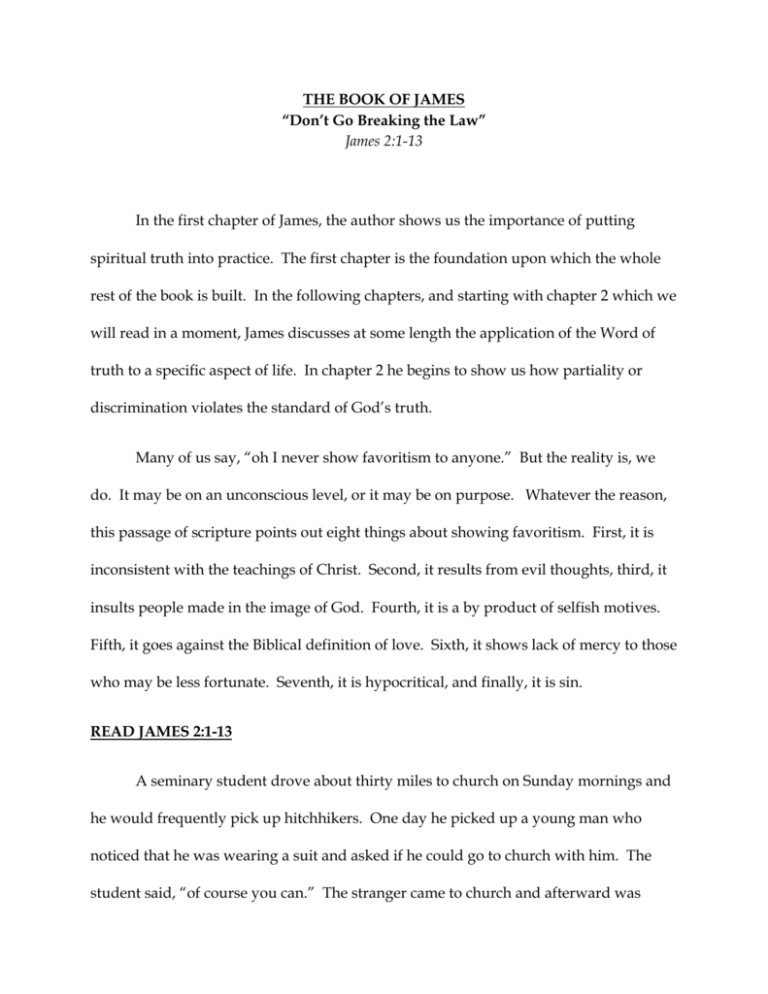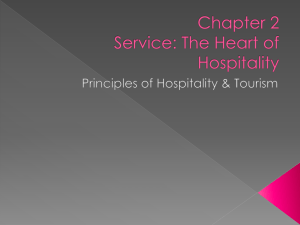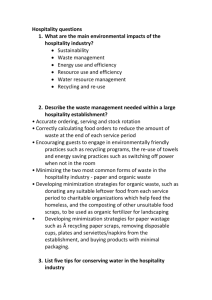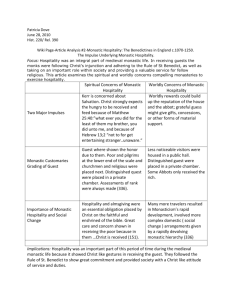Don`t Go Breaking the Law - Clemmons First Baptist Church
advertisement

THE BOOK OF JAMES “Don’t Go Breaking the Law” James 2:1-13 In the first chapter of James, the author shows us the importance of putting spiritual truth into practice. The first chapter is the foundation upon which the whole rest of the book is built. In the following chapters, and starting with chapter 2 which we will read in a moment, James discusses at some length the application of the Word of truth to a specific aspect of life. In chapter 2 he begins to show us how partiality or discrimination violates the standard of God’s truth. Many of us say, “oh I never show favoritism to anyone.” But the reality is, we do. It may be on an unconscious level, or it may be on purpose. Whatever the reason, this passage of scripture points out eight things about showing favoritism. First, it is inconsistent with the teachings of Christ. Second, it results from evil thoughts, third, it insults people made in the image of God. Fourth, it is a by product of selfish motives. Fifth, it goes against the Biblical definition of love. Sixth, it shows lack of mercy to those who may be less fortunate. Seventh, it is hypocritical, and finally, it is sin. READ JAMES 2:1-13 A seminary student drove about thirty miles to church on Sunday mornings and he would frequently pick up hitchhikers. One day he picked up a young man who noticed that he was wearing a suit and asked if he could go to church with him. The student said, “of course you can.” The stranger came to church and afterward was invited over to one of the members homes for lunch and fellowship. While there, he received a hot bath, some clean clothes, and a hot meal. In conversation with the youth, his hosts found that he was a Christian, but he had been out of fellowship with the Lord. His home was in another state and he was just passing through on his way back. Later in the evening, they bought him a bus ticket and sent him on his way. A week later, the seminary student received a letter from the hitchhiker. Enclosed with the letter was a newspaper clipping with the headline: “Man turns himself in for murder.” This young man had killed a teenage boy in an attempted robbery and had been running away from the law for some time. But the kindness and hospitality of Christians had convicted him. He wanted to be in fellowship with God, and he knew he needed to do the right thing about his crime. Little did those Christians know that by their faithfulness to show hospitality they had influenced a man to do what was right in God’s eyes and thereby help restore him to fellowship with his Lord. In this passage James condemns acts of favoritism. Often we treat well dressed people better than some who looks shabby. We do this because we would rather identity with success. The irony is that James reminds that those supposed winners may have gained their success at our expense. God views all people as equals. What is it that Paul said, “there is neither Jew or Greek, nor slave or free, or male or female for we are all one in Christ Jesus.” You all can relax, because tonight I don’t want to focus on the poor or rich scenario. We’ve played that one out many times, but I think what the main point that James is making in this passage is the idea of hospitality. Are we hospitable to other? Are we welcoming to others? Singer John Charles Thomas at age 66 wrote to syndicated columnist Abigail Van Buren. He said to her, “I am presently completing the second year of a three year survey on the hospitality or lack of it in churches. To date, of the 195 churches I have visited, I was spoken to in only one by someone other than an official greeter-and that was to ask me to move my feet.” There are two things I want us to see from this passage. First, our church should be open and welcoming to every individual who enters through our doors regardless of where they come from, how much money they make, what they look like, how they dress, or any other factor. We should be an open and loving congregation. One of my favorite books is by two ministers Ched Meyers and Matthew Collwell, and it’s called: Our God is Undocumented. In this book, they talk about the concept of a borderless church-that our church should not be confined to our own four walls, but is a part of the community as a whole. We are First Baptist Church of Clemmons. I want to emphasize the second part-of Clemmons. We are a part of a community that extends beyond our property line. How do we treat our community? How does the community view us as a church? How are we as a church involved in our community? There is another concept I want us to think about, and that’s the idea of a missional church. What does that mean? That means that the church functions as a mission base for the community. That means that we reach out beyond our walls, not just for evangelism, but to be a part of our community. To love the people of Clemmons, to look after them. If you look at small village churches in foreign countries, the church is a major part of the community. It is a community gathering place, it is a place where the church is open not just to the membership, but to the community at large. TELL THE STORY OF MARION BAPTIST CHURCH-GETTING OUTSIDE THE GATES! WE NEED TO GO WHERE THE COMMUNITY IS-REACH THE COMMUNITY WHERE IT IS! The most segregated place in our world today is the church. Not only that-but the largest group of separatists is found in the walls of the church. We seek places of worship that make us feel comfortable and we search out houses of worship to be around people who look like us, think like us, and worship like us. But, is that really what God wants from us? Likewise, when people come to our church do we shun them if they don’t look like us or think like us-or dress like us. I believe we are called to reach out to all people-not just a specific demographicbut all who are seeking to know Christ. We cannot shut people out for whatever selfish reasons we may have. We often shroud our reasons in theology or we miss quote or misinterpret scripture for our own gain to keep people out-when Christ himself reached out to ALL peoples of every race and background. The gospel of Christ wrecks havoc on the ideologies of xenophobia, racism, and exclusion. We are called to love God and love others. The love of Christ transcends all barriers that we put up. A diverse and well-rounded congregation is only achieved when we set aside our own mindset of how people should act, dress, walk, talk, and look like. We are called to be a church without a border! Second, I believe this passage points out that we are to be a sanctuary, a safehaven for individuals to come free from persecution or judgment. Churches are meant to hospitals for the spiritually sick, not country clubs. TELL THE STORY OF TRUMAN AND MELLISA-BUT DON’T USE THEIR NAMES The last time I checked we had all sinned and fallen short of the glory of God. So how can we be more hospitable to one another? TELL THE STORY OF SEMINARY-INVITING PEOPLE OVER TO OUR HOUSESTICKER ON THE FRIDGE: “LOVE PEOPLE COOK THEM TASTY FOOD” The following differentiation between hospitality and entertaining was made by Karen Mains in Open Heart Open Home. Entertaining says, I want to impress you with my home, my clever decorating, my cooking. Hospitality seeking to minister says, this is home is a gift from God, I use it as he desires. Hospitality aims to serve. Entertaining puts things before people. As soon as I get my house finished, the living room decorated, my housecleaning done-then I will start inviting people over. Hospitality puts people first. No furniture-we’ll eat on the floor. The decorating may never get done-you come anyway-the house is a mess-but you are friends-come home with us. Entertaining subtly declares, this home is mine, an expression of my personality. Look please, and admire. Hospitality whispers, what’s mine is yours. As a church are we entertaining people, or are we hospitable. QUESTIONS TO ASK: 1. How can we as a church be more hospitable to individuals? 2. How can we as a church be more hospitable to our community?







